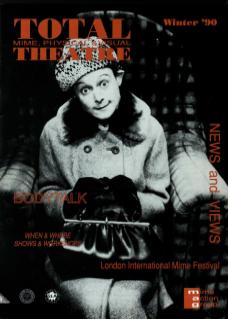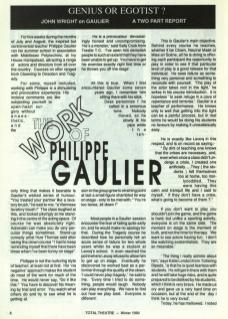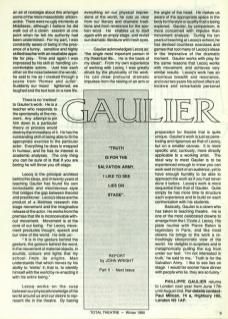For five weeks during the months of July and August, the inspired but controversial teacher Philippe Gaulier ran his summer school in association with Middlesex Polytechnic, at Ivy House Hampstead, attracting a range of actors and directors from all over the country. Courses on offer ranged from Clowning to Direction and Tragedy. For some, myself included, working with Philippe is a stimulating and provocative experience. His incisive comments are like subjecting yourself to open-heart surgery without anaesthetic, and the only thing that makes it bearable is Gaulier’s wicked sense of humour. ‘You treated your partner like a lavatory brush,’ he said to me, ‘a Viennese lavatory brush!’ The class laughed at this, and looked pityingly at me standing in the centre of the acting space. Of course he was absolutely right. Adrenalin can make you do very peculiar things sometimes. Stand-up comedy artist Huw Thomas said after taking the clown course, ‘I had to keep reminding myself that there have been times when I’ve been funny on stage’. Philippe is not the nurturing style of teacher; at least not at first. His ‘via negative’ approach makes the student do most of the work for much of the time. He would never say, ‘Do it like this’. You have to discover his meaning by trial and error. You watch what others do and try to see what he is getting at. He is a provocateur, devastatingly honest and uncompromising. ‘He’s a monster,’ said Sally Cook from Trestle Theatre Company. ‘I’ve seen him demolish people to such an extent that they have been unable to get up. You have to get his exercise exactly right first time or he throws you off the stage.’ All this is true. When I first encountered Gaulier some seven years ago, I remember him sitting there with his stick. ‘Deax personnes!’ he called in a sonorous tone. Nobody moved, so he slowly lit his pipe while the tension in the group grew to straining point. At last a small figure shambled its way on stage – only to be met with, ‘You're too tense, sit down!’ Most people in a Gaulier session encounter the fear of failing quite early on, and he would make no apology for that. During the Tragedy course he described how he personally felt an acute sense of failure for two whole years whilst he was a student at Lecoq’s school. It even reached the point where Lecoq refused to allow him to get up on stage. Eventually he discovered he worked best as a performer through the quality of the clown. ‘I could never play tragedy,’ he said to me. ‘Every time I tried to do something, people would laugh. Nobody can play everything. We have to find out how we play best. Everyone is different.’ This is Gaulier’s main objective. Behind every course he teaches, whether it be Clown, Neutral Mask or Mise en scène, all he is doing is offering each participant the opportunity to play in order to see if that particular level of play is a good release for that individual. He sees failure as something very personal and something to reconcile with yourself. ‘The play of the actor takes root in the light,’ he writes in his course introduction. It is hopeless ‘to seek refuge in a cave of repentance and remorse’. Gaulier is a teacher of performance. He knows only too well that getting into the light can be a painful process, but in real terms he would be doing his students no favours by making it unrealistically easy He is exactly like Lecoq in this respect, and is on record as saying: ‘By dint of teaching one knows that the crises are necessary, and, even when once a class didn’t undergo a crisis, I created one artificially... They (the students) felt themselves too at home, too mollycoddled. They were having this calm and tranquil life and I said to myself, “If they don’t have a crisis, what’s going to become of them?”. If you don’t want to play you shouldn’t join the game, and the game is hard; but unlike a sporting activity, everyone is on the same side. The moment on stage is the moment of truth, and not the time for therapy. We want to see actors having fun. I don’t like watching existentialists. They are so miserable.’ ‘The thing I really admire about him,’ says Katie London from Tottering Bipeds, ‘is that he is quite fearless with students. He will get in there with them and he will take huge risks, and is quite prepared to be disliked by his students, which I think is very brave. He made us cry and gave us a very hard time on occasion, but at the end of the day I think he is very loved.’ Today, he has mellowed. I noted an air of nostalgia about this amongst some of the more masochistic aficionados. There were no ugly moments at Middlesex, although I believe he did walk out of a clown session at one point when he felt his authority had been undermined. For my part, I was constantly aware of being in the presence of a funny, sensitive and highly skilled teacher with an insatiable appetite for play. Time and again I was impressed by his skill at handling uncomfortable actors. Just kiss each other on the nose between the words, he said to me as I creaked through a scene from Romeo and Juliet. Suddenly our mood lightened, we laughed and the text took on a new life. There is no ‘method’ to Gaulier’s work. He is a teacher who responds to the spontaneity of the moment. Any attempt to pin him down to a particular theory or process would destroy the immediacy of it. He has the outstanding skill of being able to fit the appropriate exercise to the particular actor. Everything he does is wrapped in humour, and he has no interest in academic analyses. The only thing you can be sure of is that if you are boring he will throw you off-stage.
“Truth is for the Salvation Army. I like to see lies on stage.”
Lecoq is the principal architect behind his ideas, and in twenty years of teaching Gaulier has found his own iconoclastic and mischievous style that bridges the gap between theorist and practitioner. Lecoq’s ideas are the product of a lifetime’s research into stage movement and the imaginative release of the actor. He works from the premise that life is inconceivable without movement. Movement is at the core of our being. For Lecoq, movement precludes thought, speech and our view of the world. He tells us: ‘It is in the gesture behind the gesture, the gesture behind the word, in the movement of material objects, in sounds, colours and lights that my school finds its origins. Man understands that which moves by his ability to “mimic” it; that is, to identify himself with the world by re-enacting it with his entire being.’ Lecoq works on the cusp between our physical knowledge of the world around us and our desire to represent life in the theatre. By basing everything on our physical impressions of the world, he cuts us clear from our literary and dramatic traditions and from reverence for the spoken word. He enables us to start again with an empty stage, and revisit our dramatic literature with fresh eyes. Gaulier acknowledges Lecoq as: ‘the single most important person in my theatrical life... He is the basis of my ideas.’ From my own experience of working with Lecoq, I was greatly struck by the physicality of his work. He can draw profound dramatic impulses from the raising of an arm or the angle of the head. He makes us aware of the appropriate space in the body for the style or quality that is being explored. Gaulier, by comparison, is more concerned with impulse than movement analysis. During his ten years of teaching at Lecoq’s school, he has devised countless exercises and games that root many of Lecoq’s ideas in the imperative of the dramatic moment. Gaulier works with play for the same reasons that Lecoq works with movement, and achieves very similar results. Lecoq’s work has an enormous breadth and resonance, and over two years his school offers an incisive and remarkable personal preparation for theatre that is quite unique. Gaulier’s work is just as penetrating and rigorous as that of Lecoq – but on a smaller canvas. It is more specific and, curiously, more directly applicable to a working artist. The ideal way to meet Gaulier is to be experienced enough to know you can work well in front of an audience, yet to have enough humility to be able to approach the work as if you had never done it before. Lecoq’s work is more sequential than that of Gaulier. Quite simply he has more time to structure each experience and to build on each confrontation with his students. Basically, Gaulier is a clown who has taken to teaching theatre. He is one of the most celebrated clowns to emerge from the Ecole Jacques Lecoq. His plate routine with Pierre Belon is legendary in Paris, and like most clowns he brings to the work a refreshingly idiosyncratic view of the world. He delights in surprises and in metaphorically pulling the rug from under our feet. ‘I’m not interested in truth,’ he said to me, ‘Truth is for the Salvation Army. I like to see lies on stage. I would far sooner have dinner with people who lie. They are so funny.’


